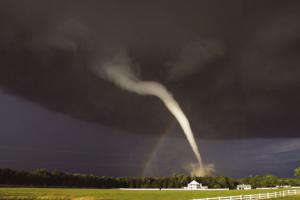TornadosOutbreaks of extreme tornados have become more common
Most death and destruction inflicted by tornadoes in North America occurs during outbreaks — large-scale weather events that can last one to three days and span huge regions. The largest outbreak ever recorded happened in 2011. It spawned 363 tornadoes across the United States and Canada, killing more than 350 people and causing $11 billion in damage. A new study shows that the average number of tornadoes per outbreak has grown by more than 40 percent over the last half century. The likelihood of extreme outbreaks — those with many tornadoes — is also greater.

Tornado plows the ground near Mulvane, Kansas // Source: ucar.edu
Most death and destruction inflicted by tornadoes in North America occurs during outbreaks — large-scale weather events that can last one to three days and span huge regions. The largest outbreak ever recorded happened in 2011. It spawned 363 tornadoes across the United States and Canada, killing more than 350 people and causing $11 billion in damage.
Now, a new study shows that the average number of tornadoes in these outbreaks has risen since 1954, and that the chance of extreme outbreaks — tornado factories like the one in 2011 — has also increased.
The study’s authors said they do not know what is driving the changes. “The science is still open,” said lead author Michael Tippett, a climate and weather researcher at Columbia University’s School of Applied Science and Engineering and Columbia’s Data Science Institute. “It could be global warming, but our usual tools, the observational record and computer models, are not up to the task of answering this question yet.” Tippett points out that many scientists expect the frequency of atmospheric conditions favorable to tornadoes to increase in a warmer climate — but even today, the right conditions don’t guarantee a tornado will occur. In any case, he said, “When it comes to tornadoes, almost everything terrible that happens, happens in outbreaks. If outbreaks contain more tornadoes on average, then the likelihood they’ll cause damage somewhere increases.”
Columbia U notes that the results are expected to help insurance and reinsurance companies better understand the risks posed by outbreaks, which can also generate damaging hail and straight-line winds. Over the last ten years, the industry has covered an average of $12.5 billion in insured losses each year, according to Willis Re, a global reinsurance advisor that helped sponsor the research. The article appears this week in the journal Nature Communications.
Every year, North America sees dozens of tornado outbreaks. Some are small and may give rise to only a few twisters; others, such as the so-called “super outbreaks” of 1974 and 2011, can generate hundreds. In the simplest terms, the intensity of each tornado is ranked on a zero-to-five scale, with other descriptive terms thrown in. The lower gradations cause only light damage, while the top ones, like a twister that tore through Joplin, Missouri, in 2011 can tear the bark off trees, rip houses from their foundations, and turn cars into missiles.
